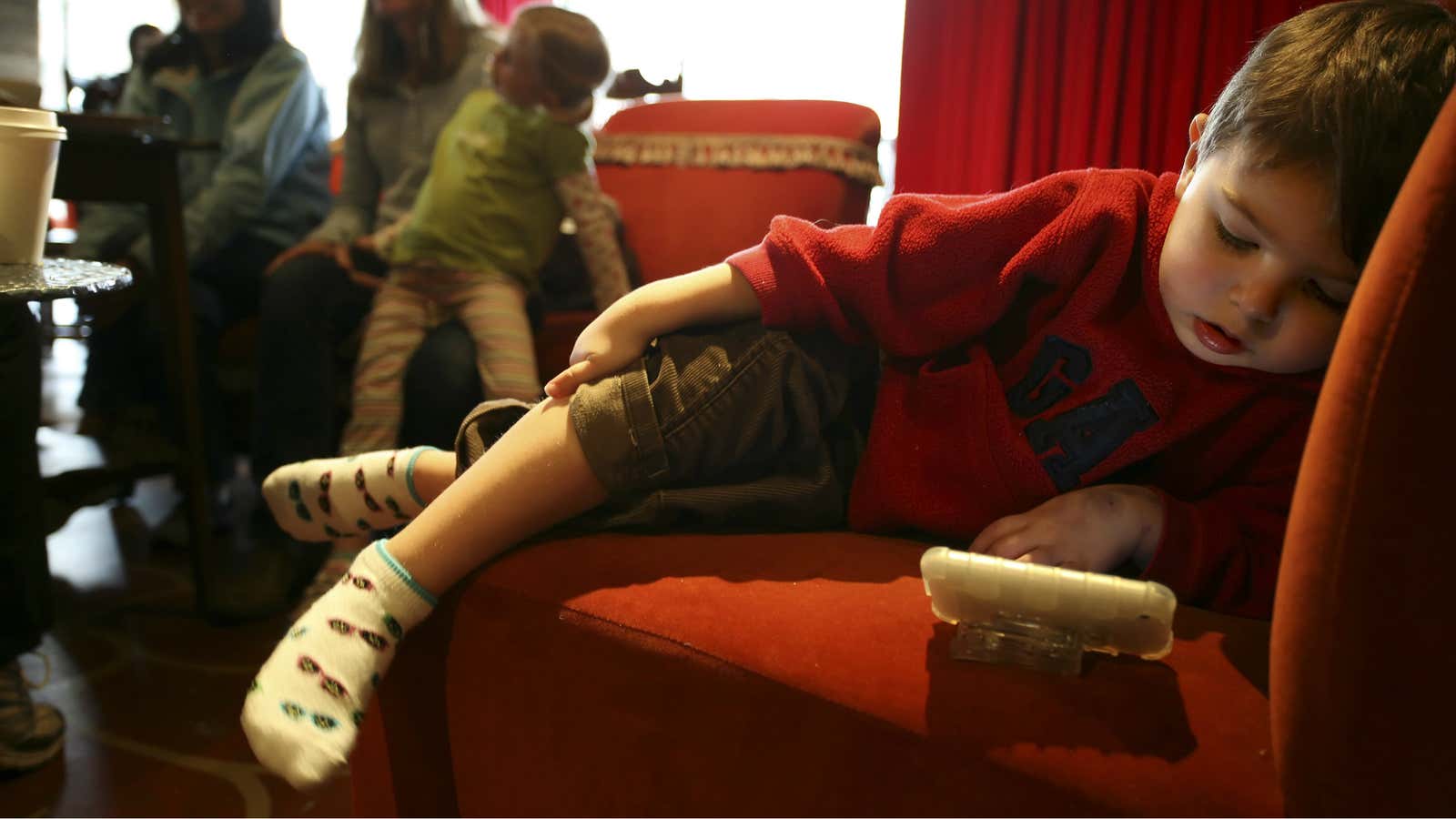Sean Parker, one of Facebook’s early investors and its first president, recently riffed on how bad Facebook probably is for our kids.
“God only knows what it’s doing to our children’s brains,” he said, referring to the dopamine hit we experience when we get a “like” on Facebook. Parents know this, and yet feel a bit helpless. They limit social media use before bed because it messes with their kids’ sleep, and they minimize use when possible at other times, because they know, or suspect, that it can mess with their kids’ well-being.
Facebook just released Messenger Kids, a ring-fenced network that says it requires parental approval before kids can use it and won’t be used for ad-targeting purposes.
Put me on the list of mean mommies saying “no.”
I won’t lie. My first instinct on seeing the news was enthusiasm: “My kids will LOVE this!” Like most parents, I like giving my children things they love. And they love technology. But it took me about three seconds to figure out that if I don’t introduce it to them, they won’t know about it. If they don’t know about it, they won’t want it. We won’t fight over it, and they won’t get addicted to it.
I have more control than I realize. I just have to exercise it.
There are plenty of things to worry about with kids online. Predators, data protection, and safety leap to mind; one psychologist told me that letting young kids onto the internet unsupervised was like sending them into a dark park at midnight with meth dealers and hoping they would come out unscathed.
But what I really worry about is addiction. And this is like giving them a vat of chocolate while explaining the dangers of sugar.
Girls, beware
A “like” feature will be part of the new product, and there is no doubt my kids will get hooked on that fast. My experience is that young girls love be liked—old girls too, to be fair—but they pay a steep price for that desire. Before puberty, the prevalence of mood disorders is about the same in boys and girls, but by mid-adolescence girls are more than twice as likely to be diagnosed as boys.
“This effort opens up children’s younger and more impressionable brains to serious concerns around attention, addiction, and distraction, which should be a huge issue for any parent,” Jim Steyer, CEO of Common Sense Media, told me. “Younger kids clearly represent very inviting targets for the current tech industry arms race for your attention.”
I have witnessed how this works. Last year, I wrote about Toca Boca, a suite of beautifully designed apps for young kids, which professed to be the gold standard in digital “free play.” To write about it, I had to test it. So I downloaded it and let my kids at it.
Toca Boca was not the first digital game they’d seen. On trips back and forth from the UK to the US, we give them free rein on devices. We download a few games—cupcake making, a storytelling one, and Bedtime math—which they have liked. But they never asked to play the games when we were not on planes, and we did not offer.
But they fell for Toca Boca, and now, every time they see my phone, they ask to play with it. Add that to the long list of things I get to say “no” to on a daily basis, along with candy, Glee, and staying up late eating candy and watching Glee.
Technology is addictive. If my phone is near me, I will check it. If my computer is open, I will literally dive into it. I play piano in the evenings (horribly, but you have to start somewhere) in an effort to focus my brain on one uninterrupted and highly challenging activity. It’s a struggle.
If I, as a 45-year old woman, find tech addictive, my kids don’t stand a chance.
Control issues
I am hardly the first to notice this. Sherry Turkle, a professor at MIT and the author of Reclaiming Conversation: The Power of Talk in a Digital Age, explained the cost of too-much technology to me in 2015 this way:
Our children can’t engage in conversation, or experience solitude, making it very hard for them to be empathetic. “In one experiment, many student subjects opted to give themselves mild electric shocks rather than sit alone with their thoughts,” she noted.
Facebook is smart to target kids young. Get them hooked at six years old and they will be raring to go at 13, when they are formally allowed to join the grown-up network (joining more than 20 million minors already there).
The company is saying all the right things. When kids make a friend request, both parents have to approve it, at which point the kids can share live video chats, send pictures, and message one another. There will be a library of specially approved GIFs. When a kid reaches 13, the data from their time on the network will not be transferred to their grown-up account.
But there is plenty of data that Facebook will still collect: our kids’ names, the content of their messages, and how they use the app. They will share that data with third parties, as long as those parties have data-protection policies that comply with the Children’s Online Privacy Protection Act in the US.
No thanks.
I know I won’t have this level of control forever. But I have it now, when they are young and less able to navigate the maelstrom of social media. I plan to use it.
